- Home
- Alan Campbell
Scar Night; Book One of the Deepgate Codex Trilogy Page 12
Scar Night; Book One of the Deepgate Codex Trilogy Read online
Page 12
“She’s come in for refuelling,” Rachel explained. “Mark’s leaving for Sandport with a trunk of orders for the outpost garrisons.” She grunted. “He’ll be long gone before the darkmoon rises.” Her gaze lifted to a thunderstorm building in the west. Suddenly she looked away, breathed a curse. “Do me a favour,” she said.
“What?”
“Fly.”
“I can’t.”
“You can.” She grabbed his jacket collar and yanked him to his feet. Suddenly she was pulling him to the edge of the tower, towards the drop.
Dill tried to resist, but she was surprisingly strong. “No, I…” Open sky loomed closer. “Wait.” He dug his heels in. “Please, don’t.” Desperately, he tried to pull away from her.
Rachel released him, eyeing him strangely. “Did you think I was going to throw you over?”
“Weren’t you?” Dill’s face was flushed, his eyes now white.
She seemed genuinely shocked. “My job is to oversee you, not kill you. I was going to get you to fly from this side of the circle to the other.” She peered over the parapet, then back at him. “That’s an idea, though. If I pitched you over…they couldn’t punish you for trying to save your own life.”
Dill recoiled.
She grabbed his hand, stopped him from backing away. “Spine humour,” she said.
He stared at her.
“Forget it.” She hesitated, then pointed to a gargoyle opposite. “Just fly from here to there.”
“Why?” he said.
She thought for a moment. “Because they won’t let you.”
“So you can report me?”
Her expression darkened. “You think I’d do that? That I’m trying to trap you? It’s only a short flight, for god’s sake. I’m not asking you to build a shrine to Iril.”
“I’ll be punished.”
“Only if you get caught. You can survive a whipping, can’t you? You’ve had enough of those before, don’t get all sanctimonious on me now. The Spine aren’t going to be coming for your bones.”
Dill started. “What?”
She sighed. “I’m sorry, that wasn’t fair. This latest husk…everyone’s talking about the Soft Men again.”
“The Soft Men?”
A puzzled frown. “You don’t know about the Soft Men?”
He stared at his feet.
“Does nothing reach that tower of yours?”
When he didn’t answer, she continued, “According to the story, the Soft Men were three scientists who once made angelwine in secret. They preyed on drunks and beggars, bled them for their souls. But when they eventually took the elixir, it drove them insane. The Church found out and sent Spine out to kill them. But the assassins couldn’t kill the three scientists. The angelwine had changed them. In the end the Spine cut out their bones and buried the men in the Deadsands. People say they’re still there, still alive after hundreds of years, but unable to dig themselves free. Camel merchants still talk about hearing moans and cries from beneath the sands.” She paused. “It’s a myth, of course. Like the Chain Creeper, the Hag, or the Roped Widow. It’s not meant to be taken seriously. At least—”
“The Roped Widow?”
“A woman from Chapelfunnel who…” She broke off. “Forget it. I’m not telling you that one. It’s too gruesome.”
Dill didn’t think it important to mention that he’d never heard of the Chain Creeper or the Hag either. But he was now in even less of a mood to be bullied into an illicit flight. He avoided her eyes, glanced at the trapdoor leading back into the temple.
“The priests never come up here,” she said.
But they always know. Didn’t she understand that?
Rachel said, “They told me there’s an elevator in the Hall of Angels.”
Dill glowered at her. “I don’t need —”
“Honestly, I didn’t believe them. I had to see it for myself, so I spoke to one of the winch operators after the Sending, a temple guard named Snat. You know they throw dice to decide which floor to take you to?”
Dill felt his eyes darken, white to grey.
“Sometimes they leave you hanging there for a while, don’t they?”
A darker grey.
“It’s a game,” she said. “How many times will you pull the bell cord? They bet on that.”
Darker still.
“Snat was up three doubles, he claimed, when I spoke to him.”
Even darker.
“Big man, he couldn’t stop laughing. Says he’s only five wins away from buying a new sword.”
Dill unfurled his wings.
“From here to there,” Rachel said. She took a step back, still clasping his hand.
The angel gave his wings a flap, and then another. And then, slowly, he began to beat them. He felt the substance of the air, felt the muscles in his shoulders and back clench when his wings descended. He quickened the beats, snapped his wings back, dragged them down, harder, and harder.
His ankles lifted.
Wisps of Rachel’s hair blew back from her face. She let go of his hand.
And he flew.
He rose breathlessly, heart pounding, his whole body tingling. Cool air caressed the back of his neck, rushed over his face. His cheeks prickled and flushed. His wings swept up-down, again and again, like hands plunging through cold springwater. He sucked in a shivering breath and it tasted crystal. Open, endless sky turned from pink to red-gold where mountains of dark cloud mounded in the west. The Deadsands simmered under the horizon, crumpled with orange shadows.
Rachel shouted something below him.
He turned to see her. This shifting of weight unbalanced him and he panicked, groped for something to hold on to, found nothing. Suddenly he was falling, flailing. His shin struck a gargoyle’s head and he rebounded, tumbled backwards, and hit the flagstones with a jolt that stole his breath.
She was by his side at once, a look of furious concern on her face. “Are you hurt? Is anything broken?”
Dill fought for air. Iron bands seemed to tighten around his chest and his breathing came in shallow gasps. Shakily, he got up and patted dirt from his trousers. Loose feathers tumbled around him. A twist of pain in his shin. He winced, staggered, then sat down on the tower’s battlements. “I’m fine. I just…”
“Just what? What’s wrong?”
His legs were trembling. “My fault. I panicked, lost control.”
“How do you feel now?”
He rubbed his shin. The pain in his chest eased and he could breathe more easily. “I feel…I don’t know…stupid.” Blood trickled down his chin.
“You cut yourself.” Rachel pulled out a handkerchief and dabbed his lip.
Dill looked at his hands. Grazes covered his palms. As soon as he noticed them, they began to sting. “I think I landed on my sword,” he said.
“Lucky you had some good hard steel to break your fall.”
He smiled weakly.
There was a softness in her expression he hadn’t seen before. “You flew,” she said. “Sort of.”
Dill cringed, and moved to stand up. “It’s getting dark,” he said. “I have to go now. They’ll be locking down the spires soon. The windows, the trapdoors.”
Rachel nodded.
“Will I see you tomorrow?” He’d asked the question lightly, even selfishly; still hoping, deep down, that this flawed day had not been real, that Rachel would understand his need for a real overseer and relinquish her job to someone more appropriate. But he saw from the tensed muscles in her face, the faintest narrowing of her eyes, that the assassin had heard a different question.
“I hope so,” she said.
Fogwill shuffled along beside his master while the old priest limped closer to his desk. He had seen Sypes move more quickly, usually when the old man wasn’t aware he was being observed or when some pressing issue forced him to forget his infirmity for a while, but Fogwill remained patient. The Codex pillars towered over them, the shelves in each crammed with books from floor
to distant vaulted ceiling—their grubby leather spines locked safely behind filigree-gilt gratings. Construction of the thirty-first pillar was currently under way. Segments of cut sandstone and slabs of facing marble lay propped on beams around the base of the half-completed column, but there were no stonemasons at work on the wooden scaffolding.
Where are they? Two months of this, and I’ve yet to see a stone raised. Are we paying these masons by the hour?
They weaved through great stacks of parchment, freshly inked and ready for the Presbyter’s perusal. Reports from the garrisons and the traders’ guild, theses by Poison Kitchen chemists, accounts, literature, history, lists, lists…and more lists. How did Sypes cope with all this? No wonder he burned the poetry.
When they finally reached the desk, Sypes eased himself into his chair, turned to Fogwill, and said, “Tell me.”
“Your Grace?”
“You’ve been hovering, Fogwill. Not in itself unusual, but you’ve been hovering silently, which is rare. Out with it.”
“This husk—this girl—apparently she was a Roper’s daughter.”
“Yes, yes.” Sypes opened a drawer and pulled out a heavy ledger embossed with the words Unaccounted Souls . “The theft must be recorded nevertheless. Her name?”
“We don’t know. There was a scuffle, and the guards sent the father away. I’ll have to make enquiries. He ought to be easy enough to trace. A death like this will be on the lips of everyone in the League.”
The Presbyter inked his quill and started writing. “I wouldn’t bother too much. Most of these records are incomplete.”
“Carnival wasn’t responsible.”
The Presbyter didn’t look up from his writing. “There’s only one soul-thief in this city, Adjunct.”
“With respect, Your Grace, the corpse was fresh on the morning before Scar Night.”
“Obviously it has been kept on ice.”
“For a whole month? Where would a Roper get that much ice?”
“These people can be ingenious, Fogwill. It proves nothing.”
Then why are you avoiding my eye? Fogwill took a deep breath. “The guard reported seeing bruises on her arm, above the elbow…”
Sypes did not look up.
“Implying that whoever bled her tied her down first. Carnival’s husks are bruised only around the ankles, from the manacles.”
Sypes was now blotting the ink in his ledger.
“This murderer is far more capricious than the Leech,” Fogwill continued. “Carnival is at least consistent in her method of slaughter. One soul for herself on Scar Night, the others…” He left the remainder of his sentence unvoiced. “But these other husks, they’re turning up at all cycles of the moon, their blood removed cleanly. Someone wants them to be found. Someone is sending us a message.”
“What message would that be?”
Fogwill wrung his hands. “Angelwine,” he said. “Someone is trying to make angelwine—and they want us to know.”
“Angelwine?” Sypes snorted. “Listen to yourself, Fogwill. Angelwine cannot be made.”
“But—”
Sypes raised a hand. “Myths, legends…old wives’ tales.”
Fogwill frowned. He cast a glance back at the books locked within the Codex pillars. Ten thousand old wives’ tales. “The commoners still believe in the Soft Men,” he said. “If Devon—”
“That’s enough.” Sypes’s tone was stern. “I won’t have you barging in here making accusations, undermining the trust we’ve built up with the military over this”—he batted a hand—“ludicrous warren gossip. Do you really dislike the man so much?”
There it was. In the seven months Fogwill had endured Sypes’s dismissals of his suspicions, four additional husks to those normally expected had turned up. Four extra souls claimed, their blood leached out, yet Carnival, for all her voracity, took only one for herself on Scar Night. But how could he convince Sypes of Devon’s guilt without telling him the precise truth?
Do I hate Devon enough to suffer your scorn?
When Fogwill had last complained about the fumes from the Poison Kitchens wilting his dear mother’s geraniums, everyone in the temple had subsequently fallen ill. Suspecting foul play, Fogwill had kicked up a terrible fuss. The bout of sickness following that complaint had given him slurry for a month, and when he’d finally recovered, it was only to discover that Devon had since begun recruiting labourers from the temple kitchens. What became of them was never investigated. That swine Fondelgrue didn’t know and didn’t care, and nor, it seemed, did anyone else.
Except, of course, Fogwill. He hesitated. “I had a friend.”
Sypes lowered his head into his hands. “I don’t want to hear this, Fogwill.”
“A kitchen porter,” Fogwill said, feeling bolstered now that the words were out. “Devon said he had four ships coming in that night, and needed strong lads to load supplies. He claims an ongoing shortage of menial labourers, and refuses to use soldiers or scholars. Says he hasn’t the time or resources to screen every cleaner and packhorse himself.”
“His words?”
“Not mine .”
“Unpalatable but necessary work, I’m sure, and the war has hard-pressed us all.” Sypes closed his ledger. “When was this?”
“Six weeks ago.”
“And what happened to your…friend?”
“Disappeared. The Poisoner pleaded ignorance, of course. Said he must have…well, I don’t really want to go into that. It wasn’t civil. His comments, quite frankly, were obscene. He hates me, so he always…” Fogwill couldn’t find the words for his frustration. “He always…”
“No body ?”
A wounded look.
“Truly I am sorry you lost your friend, Fogwill, but that’s no reason to suspect foul play. He may simply have wandered off. I understand that’s common for those employed in the Poison Kitchens. Nobody in their right mind wants to work there. Despite Devon’s official title, he is not a wicked man.”
“A moot point. Look at the weapons he devises. The level of suffering he strives for is quite unnecessary.”
“Your opinion of his work is hardly relevant.”
“Let me put the Spine on it—just to observe him.”
“Impossible.”
“We could use Rachel Hael. She’s still untempered, has connections within the military, we—”
“No. I want her watching Dill.”
“Then let me speak to the Roper,” he said, “find out where and when his daughter died, perhaps examine the body.” He surprised himself as he said it. The League of Rope was not the safest place in Deepgate.
The Presbyter shook his head. “Fogwill, we denied this girl our blessing. Her father will be hurt and grieving. I don’t want you salting his wounds. My answer is no.”
Why are you blocking me? Fogwill shook his head in frustration. Was Sypes hiding something?
A light rain began to patter against the window behind the Presbyter’s desk. The sunset was now a rip of gold between the horizon and the towering clouds. A storm was coming. It would be dark earlier than usual this Scar Night, and Fogwill suspected there would be more than one murderer at large.
11
SCAR NIGHT
RAIN FELL IN sheets, rattled catch-pans or gurgled through gutters and into the throats of cisterns. Chains steamed and dripped endlessly, shifted, groaned under the weight of waterlogged buildings—like dull iron voices in every part of Deepgate. The evening light dwindled and died, but no lamplighters appeared to brighten the streets, and soon the temple districts, the Warrens, and the League of Rope filled with darkness.
Twelve Spine assassins had gathered in Pickle Lane: gaunt-faced ghosts, unmoving; rain hissing off leather armour; knives, swords, and crossbows within easy reach of their pale hands. Of all the twelve, only Rachel shivered. She had seen the others many times before, yet knew none of their names.
A dead-eyed man with a hook-shaped scar that curled around his nose addressed her. “You wi
ll be bait.”
“Why me?”
“You have the capacity to enrage her.”
“And you don’t?” Rachel snorted. “Don’t flatter yourself. Open your mouth and say anything, she’ll be pissed, I guarantee.”
“Provoke her, Adept. Carnival will respond to you—to your insults. You have a talent for applying such emotional…devices. You will be bait.”
Conversations with the Spine were typically wooden. These were the times Rachel was almost glad she’d been spared the needles, the torture, the brutal tempering which would cleanse an Adept and allow one to function without the burden of emotion.
Almost glad.
“And, of course, you are expendable.” This came from a rakish woman with full, bloodless lips. She stood beside a slender girl who might have been her sister, a young thing with deep bruises under her vacant eyes.
God, do I look like this? Like these ghouls? These husks?
Rachel glanced from one hollow stare to the next, found nothing there. “Expendable,” she muttered. “Yes, I forgot. Stupid of me. Thanks for that.”
The rakish woman nodded stiffly.
Insults, sarcasm, irony—all wasted on her peers. Rachel would have slapped the woman if she’d thought it would anger her, but where was the satisfaction in striking a brick wall? And yet Rachel envied her, envied them all. Tempering offered an inner silence for which she would not mourn the loss of her sense of self. “Just get out of my sight,” she snapped. “I’ll meet you at the planetarium.”
The dead-eyed man said, “You will not engage Carnival until the trap has been sprung.”
“And if she attacks me before then?”
“Do nothing.”
“Nothing?”
“That is correct.”
Rachel clenched her fists. “Whatever you say.”

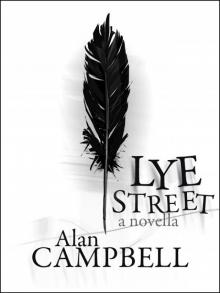 Lye Street
Lye Street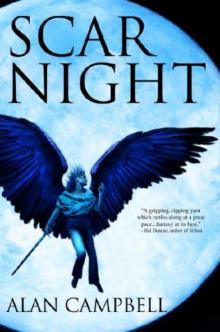 Scar Night; Book One of the Deepgate Codex Trilogy
Scar Night; Book One of the Deepgate Codex Trilogy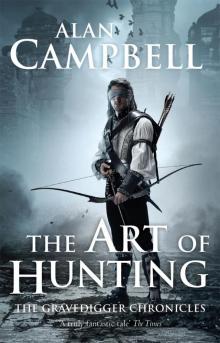 Art of Hunting
Art of Hunting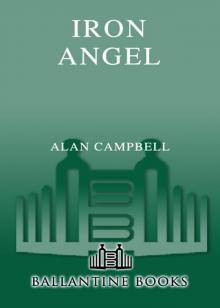 Iron Angel
Iron Angel Gravedigger 01 - Sea Of Ghosts
Gravedigger 01 - Sea Of Ghosts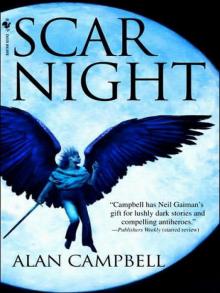 Scar Night
Scar Night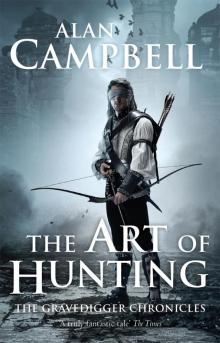 The Art of Hunting
The Art of Hunting God of Clocks
God of Clocks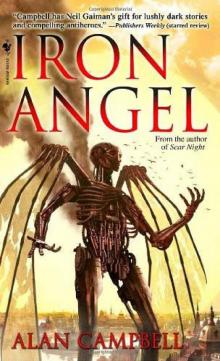 Iron Angel dc-2
Iron Angel dc-2